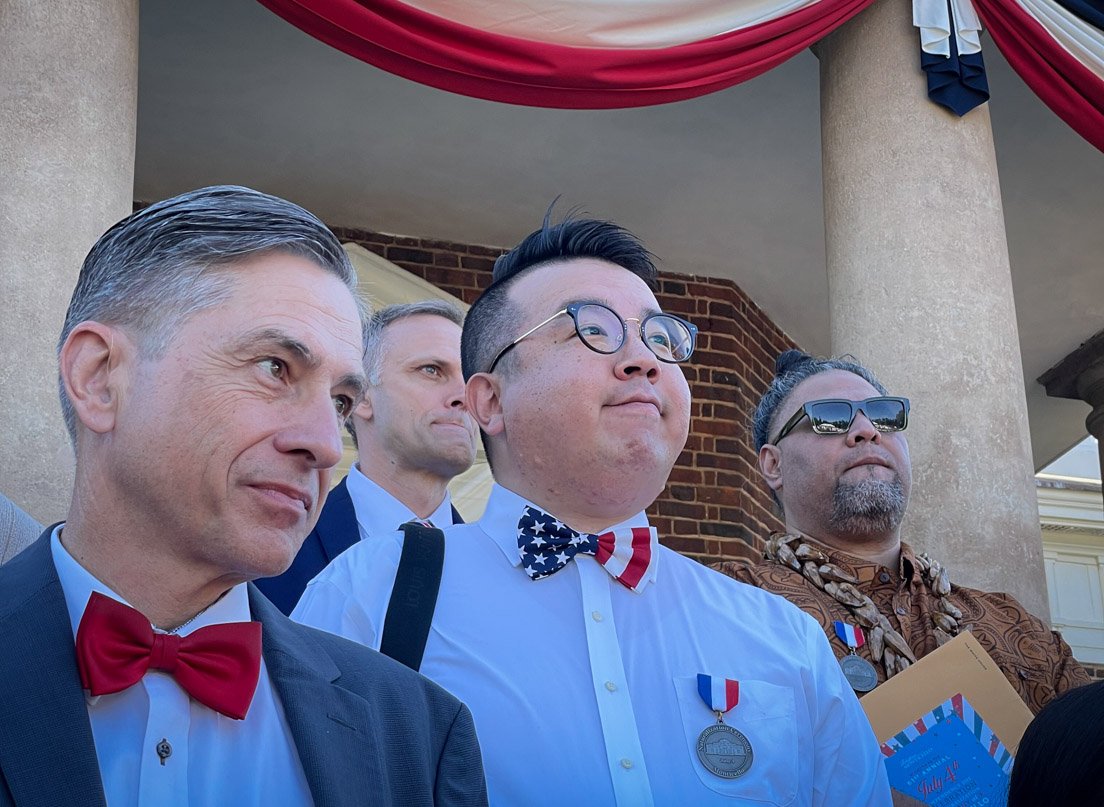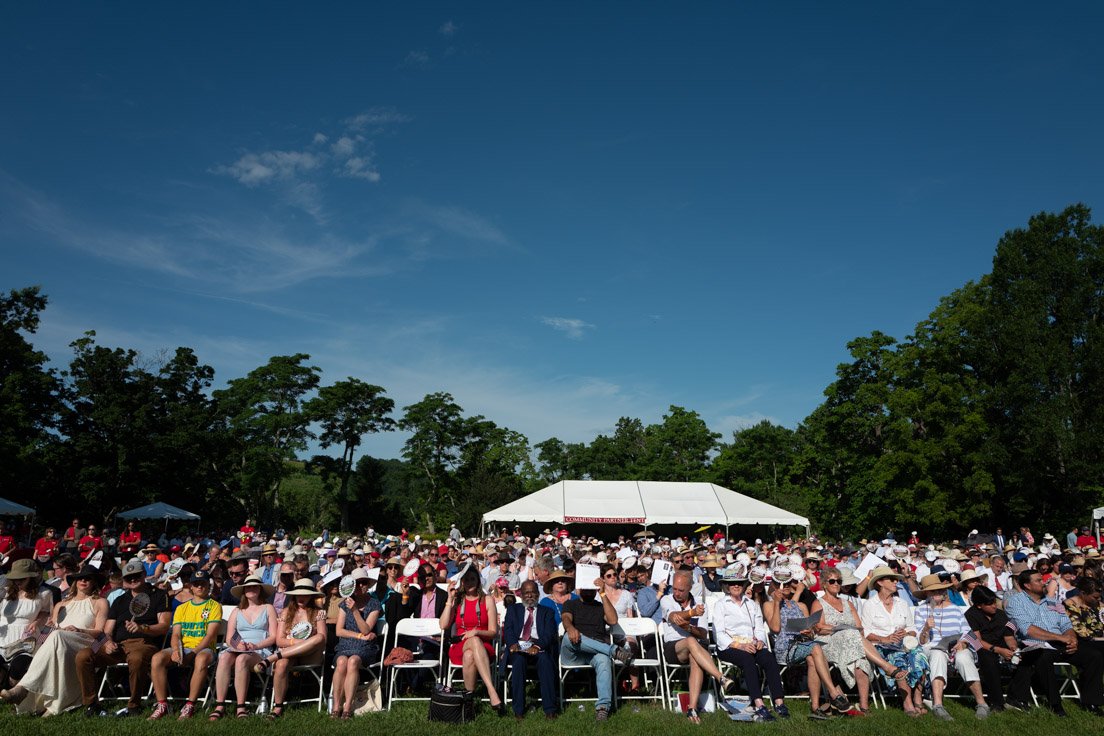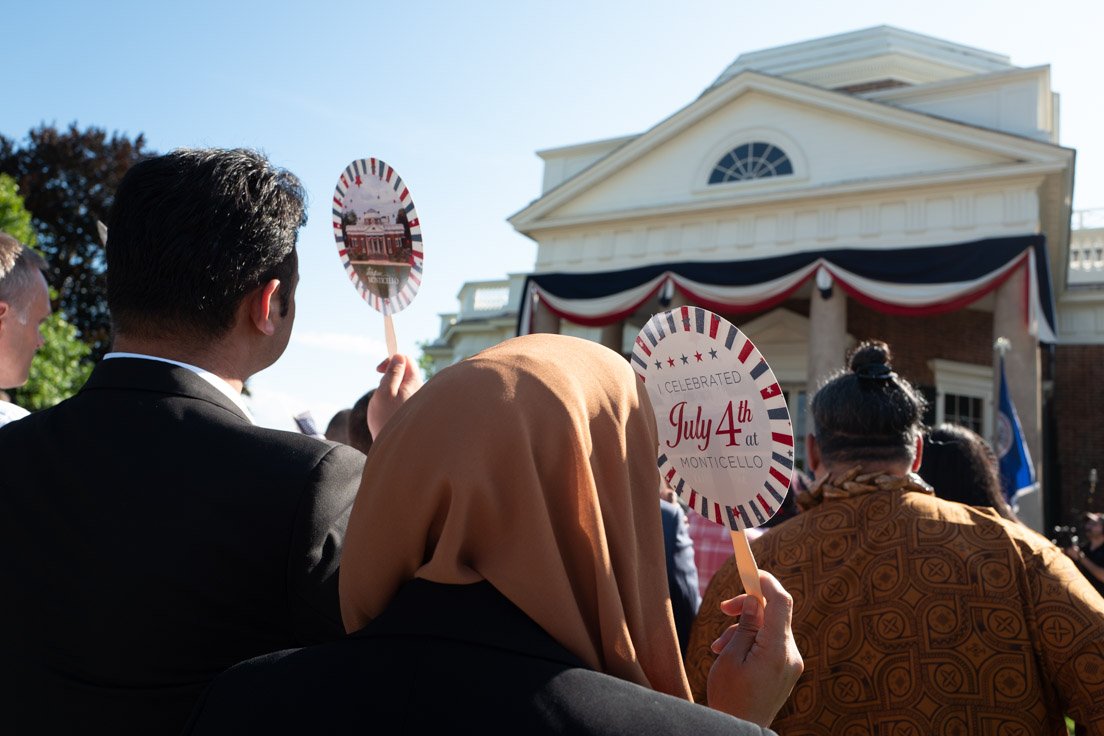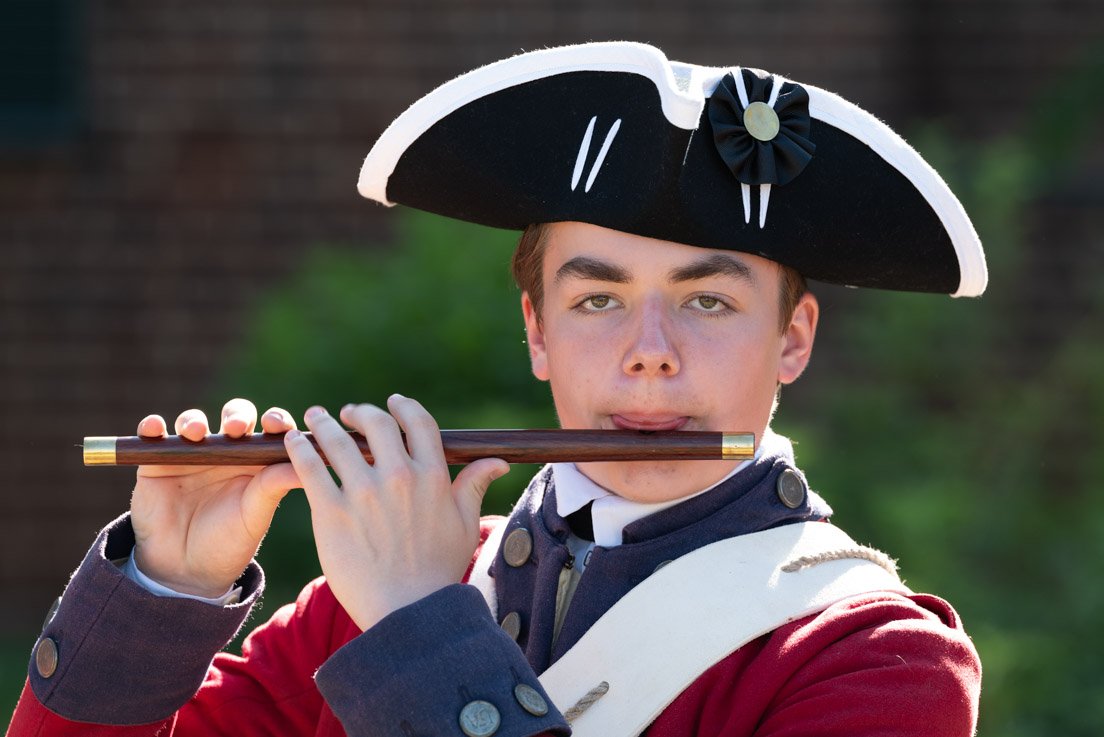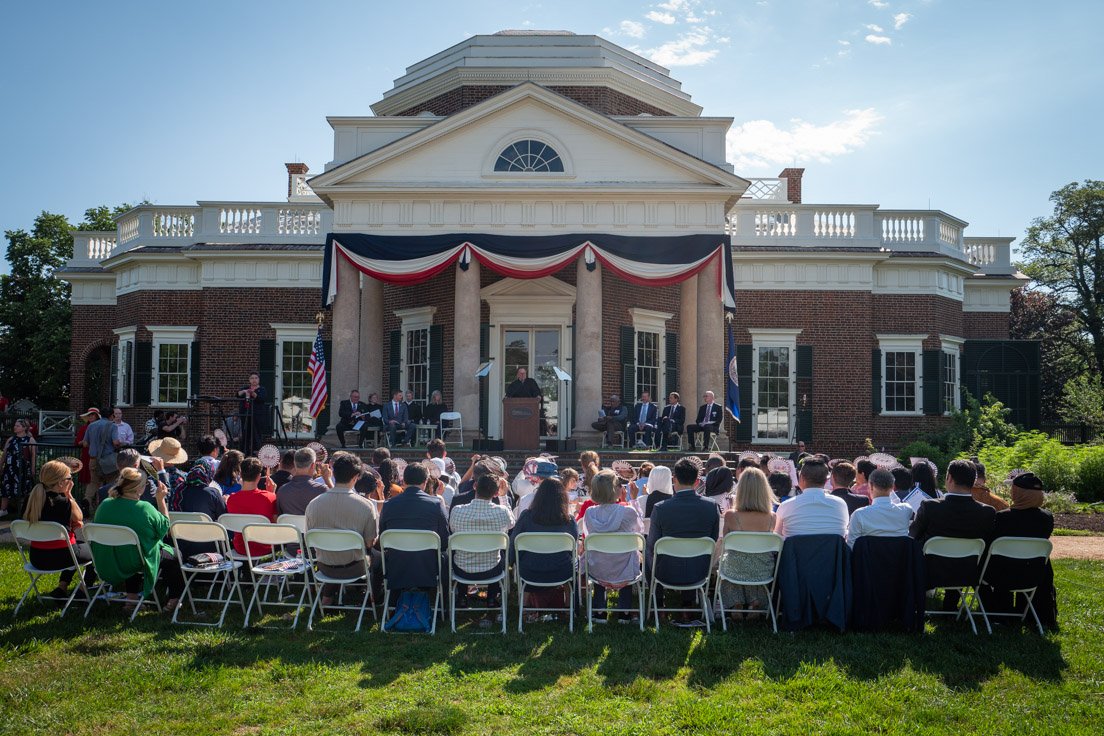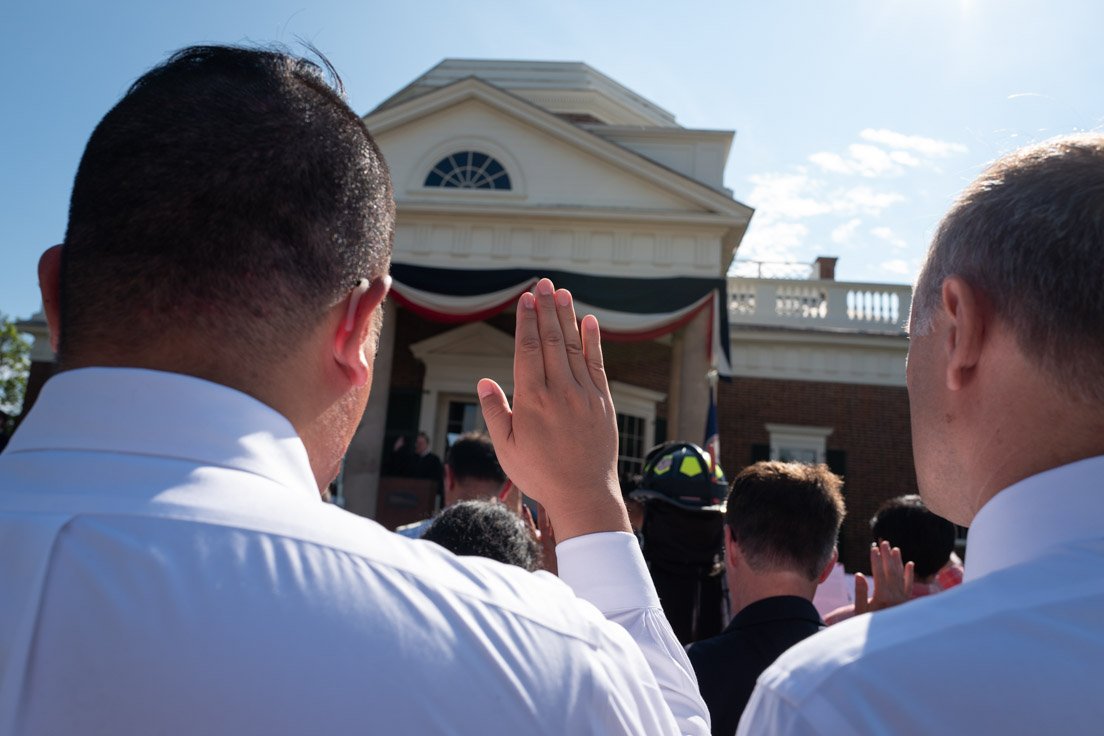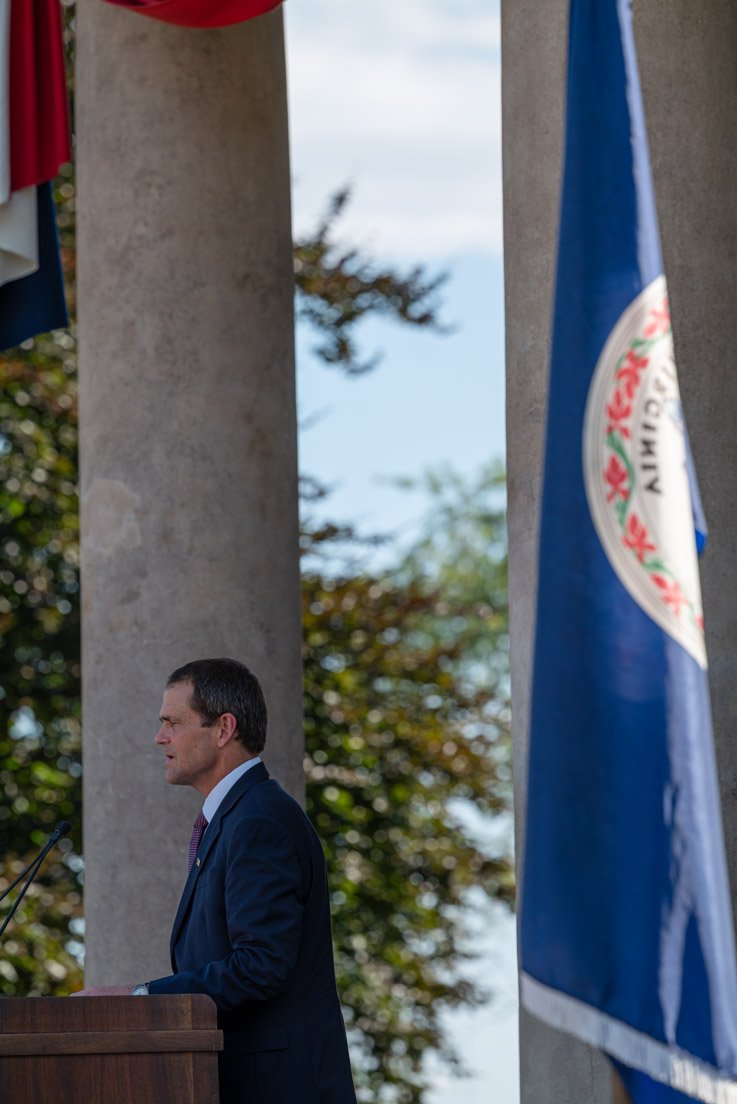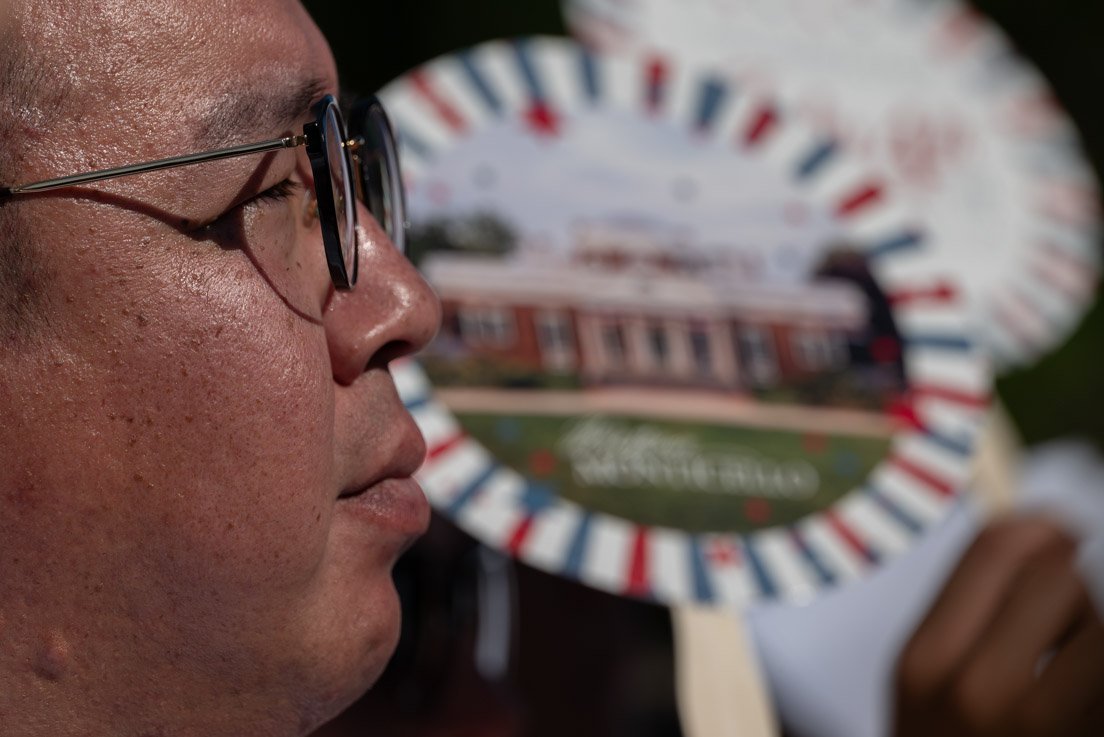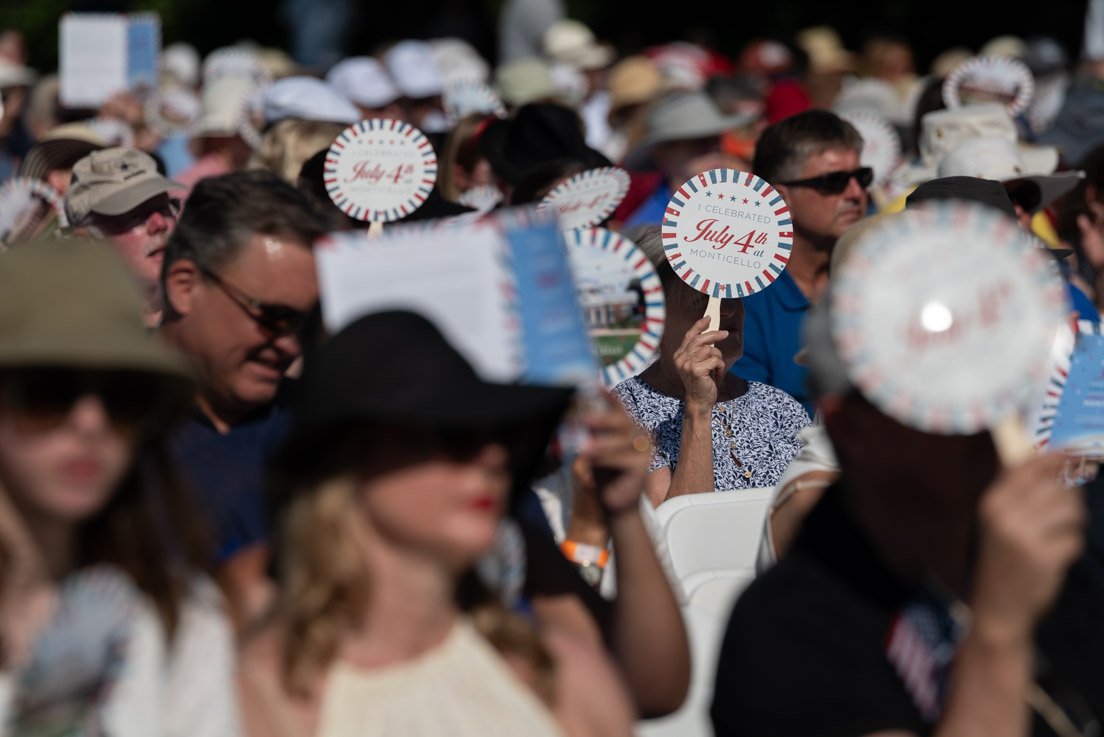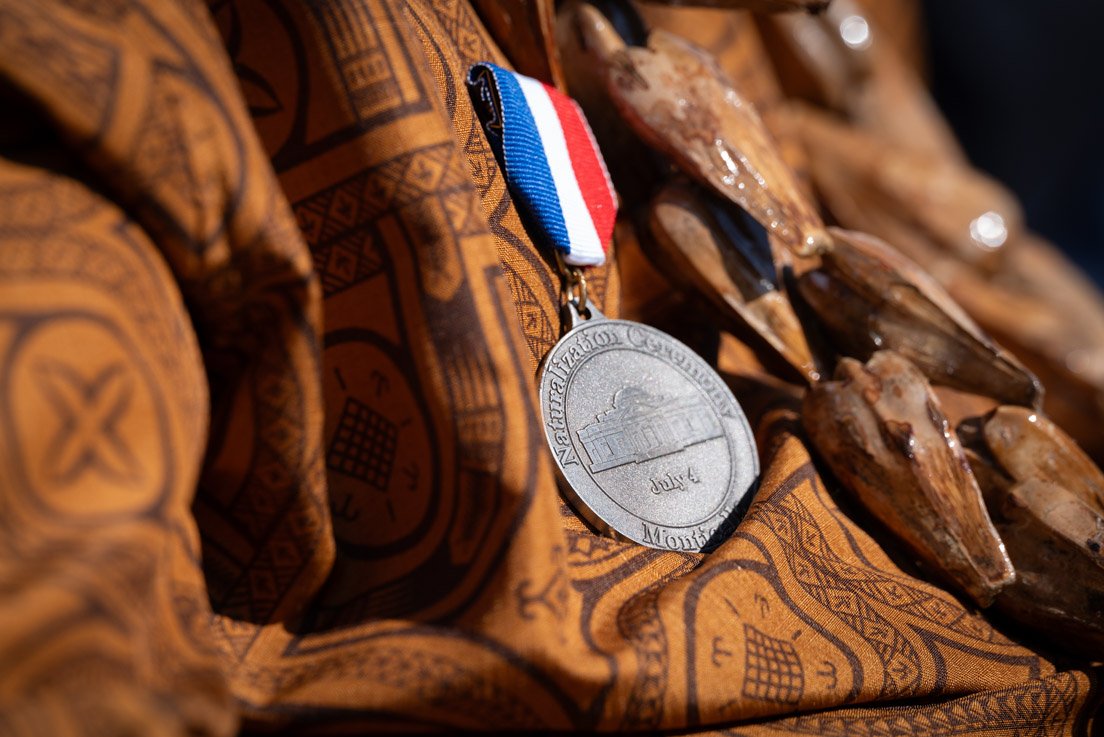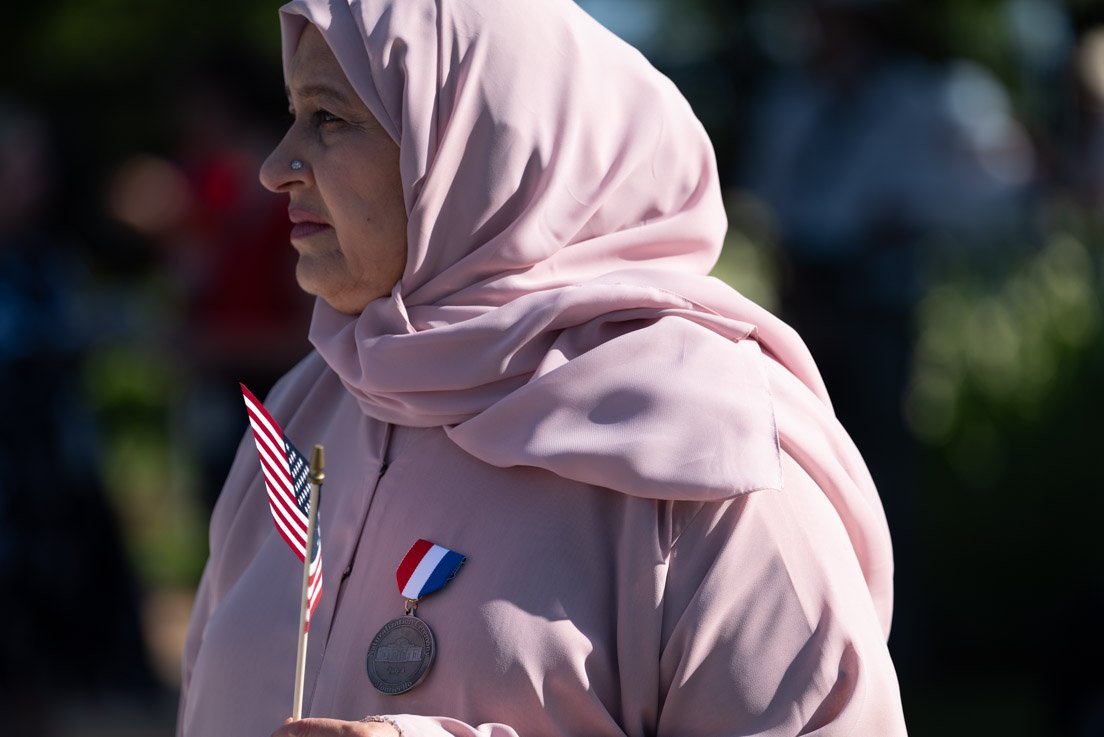At Jefferson’s Monticello, launching a U.S. future
Stephen Baek stands and waves an American flag after he is announced as a new U.S. citizen during the naturalization ceremony at Monticello on July 4th. Photo by Christopher Tyree
Inspired by Thomas Jefferson and Hollywood blockbusters, a Korean scientist becomes an American citizen
By Leah Small
The Virginia Center for Investigative Journalism at WHRO
CHARLOTTESVILLE - Stephen Baek, a native of South Korea, took an oath of loyalty to the United States on the Fourth of July at Thomas Jefferson’s Monticello.
Baek joined more than 50 immigrants for the 61st annual naturalization ceremony held on the mountain-top estate of the author of the Declaration of Independence. Under the bright morning sun, an audience of friends, family and welcoming citizens wearing red, white and blue celebrated the new Americans.
Before the ceremony’s close, those gathered listened to a reading of the Declaration of Independence. Baek sat silently with head and eyes lowered, as he read along from a pamphlet. It was the first time, Baek said, he had read the declaration in its entirety. He was struck by how the founding document speaks to America’s history as a nation of immigrants.
“America has such a diverse society. Immigrants from all backgrounds gathered, worked hard, and achieved this shared goal of building a society where individuals can pursue their happiness, their dreams,” Baek said.
Baek, a scientist and engineer, pursued his dreams when he came with his wife to the U.S. in 2015 on a work visa to teach at the University of Iowa. Their daughter was born shortly after they arrived. The family moved to Virginia in 2021. Six months ago, Baek began the process of applying for citizenship, which first requires five years of permanent residency.
Baek, 37, is an associate professor of data science at the University of Virginia, founded by Jefferson. Living in the U.S. has broadened the possibilities for his work, he said, and his. research is wide-ranging. He has analyzed body shape to determine, to the dollar amount, how much weight and height impact annual salaries, and has shed light on how tumor shape correlates with cancer metastasis.
Baek’s interest in the U.S. was first sparked by his father’s love of Hollywood movies. Now in America, he copes with homesickness and navigates cultural differences, but feels his family’s choice to leave Korea has brought both promise and opportunity.
This interview has been lightly edited for length and clarity.
Back in 2014, I was just out of graduate school and I wanted to find a job. I was about to get married with my wife and we're kind of having a lot of conversations about what is going to be our future, you know, those kinds of things. And then we kind of liked the idea of having an experience outside of Korea because Korea is a small country. I personally had a lot of curiosity about American culture and the people here because I grew up watching a lot of Hollywood movies.
My dad was a huge movie fan. So, I still remember every weekend we would go to videotape rental stores. You don't find those nowadays. But we had those a lot back in Korea and we would rent five or six videos, and then we would watch movies.
The movies that I enjoyed the most are the ones like Die Hard and, you know, like all these action movies. And I guess we watched a lot of comedy movies. We watched almost every Robin Williams film. It was clearly different from Korean culture. The American culture depicted in those movies was more free. People were more willing to discuss their thoughts and feelings. Asian culture is more like, you stay quiet. They’re rather slow in expressing their feelings.
My wife was pregnant when we first arrived in the United States. We didn’t have any friends or family here. So we honestly had a hard time. But people around us were really willing to help us in many different ways. And I thought that was really amazing because I grew up in a big metropolitan city in South Korea – Daegu. It’s the third largest city (in South Korea). Compared to Americans, we’re also kind of shy and don’t really speak to strangers. Versus here, everyone’s willing to help, ask a lot of questions about us, things like that.
In Asian culture, we don’t usually advertise, oh, we’re having a baby, or anything like that because if I tell you we are having a baby, then you’ll have to worry about, oh, what kind of present should I prepare. It's kind of like a burden you unintentionally give to your neighbors and friends.
But somehow [our American friends] all knew that we’re having a baby and they offered a present and asked if we needed anything. They offered a lot of suggestions. They wrote letters celebrating the birth of our child, all of these kind gestures. And I think all of those were kind of important factors that contributed to us forming a positive first impression of this new country that we’re living in.
I personally had the (good) fortune of meeting with a lot of good people, so I personally didn’t feel any bigotry or racism or anything like that. Of course, you know, I cannot generalize my experience to other immigrants.
Scenes from the naturalization ceremony at Monticello in Charlottesville, Virginia, July 4, 2023. Photographs by Christopher Tyree
I miss people. Like, all of my friends and family are in Korea. I guess that’s the hardest part. So when [my daughter’s] granddad first saw her, she was 6 months old. And then the next time her granddad saw her, she was already 3, 4 years old. And then most recently, it was 6 years old.
Every month, every week, everyday is different for little kids. But to my parents and to my parents in-law, my daughter is like a snapshot. The support system is really what matters to little kids. So not having that access sometimes makes me feel bad for my kid. Because there’s less interaction, especially before school age.
What would usually happen is you would get to talk to your grandma, your uncle, your aunt, and that’s how you learn to socialize. In our case, it was just the three of us. For my daughter, there were not a lot of people to talk to. So, I was honestly a little worried about her. At home, since my wife doesn’t speak English very well, we usually speak in Korean. And before (entering) school, my daughter only spoke Korean.
By the time my daughter finally became an age to go to school, COVID hit, and I was actually quite concerned about her lack of exposure to social interactions. But you know, it turned out I worried for nothing. My daughter did incredibly well, and I’m very proud of her.
[In regard to work] the biggest culture shock was the definition of engineering. In Korea, and many other countries, the definition of engineering is given a limited resource, how can we extract the maximum out of it. It is all about optimizing, improving the system to be more efficient and effective. Versus here, I guess the definition of engineering is creating something new.
I guess in other countries, when someone has an idea, I think the idea will get evaluated from the perspective of, is it optimal given the resources given to us? Versus here, I think the mindset is, is this a new, cool, exciting idea?
Because I’m surrounded by a lot of interesting colleagues here, not just at the University of Virginia, but across America, I have a chance to exchange ideas and understand their problems.
I think [Jefferson] would be proud of what’s going on at [UVA] right now. At the core of Jefferson’s idea was this ideal that everybody comes together, the whole concept of an academic village. Students, faculty and staff have free discussions and exchange ideas, that was the foundational basis of Jefferson creating the University of Virginia.
And that’s what’s happening here at UVA. And I think compared to Jefferson’s time, it’s even more diverse. We have more diverse faculty. More diverse disciplines. Lots of interesting ideas. I personally believe that if Jefferson were here now, he’d be proud of that.
Throughout the [naturalization ceremony at Monticello], I was thinking that the event was a great reminder that America has such a diverse society in a country where immigrants with different backgrounds all gather, work hard, and achieve this shared goal of building a society where individuals can pursue their happiness, their dreams.



